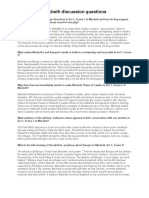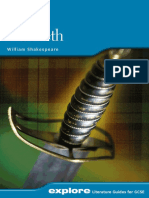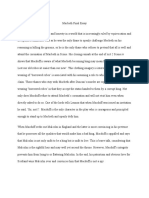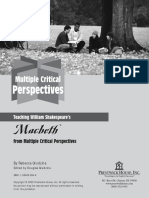100%(1)100% found this document useful (1 vote)
1K viewsMacbeth Quote Bank
Macbeth Quote Bank
Uploaded by
Rachel AppsThe document provides a selection of quotes from Macbeth along with analysis of the techniques used and significance relating to power. The quotes show how the witches manipulate Macbeth's ambition through prophecy, how Lady Macbeth encourages Macbeth's violent actions to gain the throne, and how Macbeth's paranoia and madness increase as he commits more violence to maintain power. The document analyzes how characters like Banquo and Malcolm see the corrupting influence of power on Macbeth, and how Lady Macbeth is driven to madness by her role in Macbeth's bloody rise and rule.
Copyright:
© All Rights Reserved
Available Formats
Download as DOCX, PDF, TXT or read online from Scribd
Macbeth Quote Bank
Macbeth Quote Bank
Uploaded by
Rachel Apps100%(1)100% found this document useful (1 vote)
1K views2 pagesThe document provides a selection of quotes from Macbeth along with analysis of the techniques used and significance relating to power. The quotes show how the witches manipulate Macbeth's ambition through prophecy, how Lady Macbeth encourages Macbeth's violent actions to gain the throne, and how Macbeth's paranoia and madness increase as he commits more violence to maintain power. The document analyzes how characters like Banquo and Malcolm see the corrupting influence of power on Macbeth, and how Lady Macbeth is driven to madness by her role in Macbeth's bloody rise and rule.
Original Title
322549660-macbeth-quote-bank.docx
Copyright
© © All Rights Reserved
Available Formats
DOCX, PDF, TXT or read online from Scribd
Share this document
Did you find this document useful?
Is this content inappropriate?
The document provides a selection of quotes from Macbeth along with analysis of the techniques used and significance relating to power. The quotes show how the witches manipulate Macbeth's ambition through prophecy, how Lady Macbeth encourages Macbeth's violent actions to gain the throne, and how Macbeth's paranoia and madness increase as he commits more violence to maintain power. The document analyzes how characters like Banquo and Malcolm see the corrupting influence of power on Macbeth, and how Lady Macbeth is driven to madness by her role in Macbeth's bloody rise and rule.
Copyright:
© All Rights Reserved
Available Formats
Download as DOCX, PDF, TXT or read online from Scribd
Download as docx, pdf, or txt
100%(1)100% found this document useful (1 vote)
1K views2 pagesMacbeth Quote Bank
Macbeth Quote Bank
Uploaded by
Rachel AppsThe document provides a selection of quotes from Macbeth along with analysis of the techniques used and significance relating to power. The quotes show how the witches manipulate Macbeth's ambition through prophecy, how Lady Macbeth encourages Macbeth's violent actions to gain the throne, and how Macbeth's paranoia and madness increase as he commits more violence to maintain power. The document analyzes how characters like Banquo and Malcolm see the corrupting influence of power on Macbeth, and how Lady Macbeth is driven to madness by her role in Macbeth's bloody rise and rule.
Copyright:
© All Rights Reserved
Available Formats
Download as DOCX, PDF, TXT or read online from Scribd
Download as docx, pdf, or txt
You are on page 1of 2
Macbeth- Quote Bank
*Below is a small selection of quotes that may be relevant to you in discussing
power in Macbeth
Quote Technique Analysis
“All hail Macbeth, Thane of Repetition - The witches use their supernatural powers to
Glamis.|All hail Macbeth, Thane of prophesy Macbeth’s future and manipulate his
Cawdor.| All hail Macbeth, that shalt ambition.
be king hereafter.” (1.3.46-48) - The witches’ abuse of their power drives the action
of the play, planting the scene for Macbeth’s violent
reign.
Macbeth: “Glamis, and Thane of Aside - Ross and Angus’ message that Duncan has granted
Cawdor: | The greatest is behind. Macbeth the title of Thane of Cawdor gives credibility
(1.3.115-116) to the witches’ prophecies.
- Shakespeare uses an aside to communicate
Macbeth’s thoughts as he begins to consider that he
may become King and reveal his ambitious character
to the audience, whilst veiling it from Banquo.
Macbeth: “If good, why do I yield to Soliloquy/ aside - Shakespeare uses a soliloquy (once again in the form
the suggestion, |Whose horrid image of an aside) to allow the audience to learn of
doth unfix my hair| And make my Macbeth’s dark and treacherous thoughts, while
seated heart knock at my ribs| Against hiding them from the other characters on stage.
the use of nature?” (1.3.133-136) - It is clear that Macbeth’s ambitious nature has been
quickly awoken by the witches’ prophecies. They have
abused their power to great effect, with Macbeth
already considering murdering his King.
Banquo: “Look how our partner’s Characterisation/ - Banquo’s comment serves to emphasise that
rapt.” (1.3.141) dialogue Macbeth is deep in thought after hearing the
prophecies. He is so lost in thought that Banquo
notices his distraction.
Banquo: “And oftentimes, to win us to Juxtaposition/ - Directly in contrast to Macbeth, Banquo is not so
our harm, the instruments of darkness characterisation easily taken in. He is cautious of the supernatural
tell us truths;|Win us in honest trifles, beings, and warns that they often operate in ways
to betray’s| In deepest consequence.” that seduce men into devious actions, and lead them
to their downfall.
- Serves to emphasise that Macbeth and Banquo do
have the power of choice over their actions in the face
of the witches’ prophecies/ ambition and temptation
Exit (Attendant) Stage direction, - The stage direction indicates that Lady Macbeth’s
Lady Macbeth: “The raven himself is soliloquy attendant exits the stage, leaving her alone
hoarse| That croaks the fatal entrance - The soliloquy allows the audience to hear Lady
of Duncan| Under my battlements” Macbeth’s thoughts, revealing her to be even more
(1.5.36-38) ambitious than her husband. She is willing to kill her
king in order to attain greater power without a second
thought.
Lady Macbeth: “When you durst do it, Dialogue, - Lady Macbeth taunts her husband after he refuses to
then you were a man.” (1.7.49) characterisation go ahead with the plan to murder Duncan. She
manipulates him by suggesting that he is cowardly and
has betrayed her- he is not a man.
- Lady Macbeth abuses her power as Macbeth’s wife
Exit Servant Stage directions, - The stage directions indicate that Macbeth’s servant
Macbeth: “To be thus is nothing| But soliloquy exits, leaving Macbeth alone to think
to be safely thus. Our fears in - The soliloquy allows us to hear Macbeth as he thinks
Banquo| Stick deep” (3.1.49-51) aloud. Although he is King, and has attained the
highest position of power, he is now fearful that it will
be taken away. The impact of such power on Macbeth
is that it has made him paranoid, and turned him into
a tyrant who would murder his friend in order to
secure his position.
Exits and entrances of Banquo’s ghost Staging, dialogue - The appearance of Banquo’s ghost emphasises that
(Act 3 scene 4) Macbeth’s violent murder of his friend, committed in
Macbeth: “Thou canst not say I did it; order to maintain and secure power, has caused guilt
never shake| Thy gory locks at me!” and paranoia in the King. Macbeth’s descent into
(3.4.50-51) violence and madness is a consequence / impact of his
rise to power.
- In death, Banquo wields more power than in life.
Macbeth’s behaviour at the banquet arouses
suspicions about his role in Duncan’s murder in his
Thanes and can be seen as the beginning of his
downfall.
Malcolm: “This tyrant, whose sole Characterisation - Malcolm highlights that while Macbeth is now a
name blisters our tongues,| Was once brutal tyrant, maintaining his power through violence,
thought to be honest” (4.3.12-13) he used to be a trusted Thane to Duncan. Ambition
and power have corrupted a once good man.
Macduff: “Not in the legions| Of Diction, - Macduff is saying that Macbeth is more evil than
horrid hell can come a devil more Characterisation, even the devil. He has gone from being the worthy
damned| In evils to top Macbeth.” Biblical allusions and noble Thane supporting his rightful King to
(4.3.55-57) murdering God’s representative on Earth.
Lady Macbeth: “Here’s the smell of Monologue - Lady Macbeth is sleepwalking: she is literally trying
blood still; all the perfumes of Arabia to wash her hands of the blood of Macbeth’s victims.
will not sweeten this little hand!” - Her guilt over her role in the murder of Duncan and
(5.1.42-43) her husband’s descent into violent tyranny has sent
Lady Macbeth mad. Gaining and maintaining power/
abusing power has come at the cost of her sanity. She
later commits suicide, unable to deal with her guilt.
You might also like
- Macbeth Unit Test Study Question and AnswersDocument11 pagesMacbeth Unit Test Study Question and Answersapi-28571987597% (31)
- Macbeth Cheat Sheet-Credit CreatorDocument2 pagesMacbeth Cheat Sheet-Credit CreatorCheong Neville100% (3)
- Macbeth and The Abuse of Power - Quote BankDocument3 pagesMacbeth and The Abuse of Power - Quote BankLaura Jane60% (10)
- Macbeth For BeginnersDocument11 pagesMacbeth For BeginnersPetraNo ratings yet
- Macbeth Scene SummariesDocument3 pagesMacbeth Scene SummariesArtin Farazfar100% (2)
- Macbeth in 10 Minutes by Joem AntonioDocument12 pagesMacbeth in 10 Minutes by Joem AntonioChris WalkerNo ratings yet
- Macbeth and Lady Macbeth Poster PDFDocument1 pageMacbeth and Lady Macbeth Poster PDFGupi PalNo ratings yet
- Full Quote Analysis For Every Act - MacbethDocument13 pagesFull Quote Analysis For Every Act - MacbethFVCproductions100% (2)
- English Macbeth Study NotesDocument4 pagesEnglish Macbeth Study NotesEmmah Peters100% (1)
- Literary Techniques in MacbethDocument10 pagesLiterary Techniques in MacbethValeri Lopez100% (6)
- GCSE Macbeth WorkbookDocument26 pagesGCSE Macbeth WorkbookDamask RoseNo ratings yet
- Macbeth Study GuideDocument6 pagesMacbeth Study GuidelisayabNo ratings yet
- Macbeth Key QuotesDocument3 pagesMacbeth Key Quotesifodifodf50% (2)
- ACT 1, SCENE 7: Macbeth's CastleDocument3 pagesACT 1, SCENE 7: Macbeth's CastleViranthi CoorayNo ratings yet
- Macbeth Quote AnalysisDocument5 pagesMacbeth Quote AnalysisJonathan Chen100% (3)
- Macbeth QuestionsDocument11 pagesMacbeth Questionsmamoon sikandarNo ratings yet
- HANDOUT - 2 Important Quotes ExplainedDocument2 pagesHANDOUT - 2 Important Quotes ExplainedJayapal ReddyNo ratings yet
- Macbeth NavigatorDocument10 pagesMacbeth NavigatorSofia PereiraNo ratings yet
- Macbeth Character AnalysisDocument10 pagesMacbeth Character AnalysisKrishank Krishnan100% (3)
- Macbeth Teaching PackDocument200 pagesMacbeth Teaching Packwarat92% (12)
- Macbeth Teacher Guide ComDocument27 pagesMacbeth Teacher Guide Commrrobvs100% (6)
- Character Motivation in MacbethDocument3 pagesCharacter Motivation in Macbethapi-277950890100% (1)
- Macbeth Short ScriptDocument19 pagesMacbeth Short ScriptPamela Alvarez100% (1)
- Character Motivation in MacbethDocument3 pagesCharacter Motivation in Macbethapi-277923913No ratings yet
- MACBETH Act 1 SC 5-7Document3 pagesMACBETH Act 1 SC 5-7Darshan ShahNo ratings yet
- Macbeth Close StudyDocument24 pagesMacbeth Close StudyWatzitooya5678No ratings yet
- Macbeth Act 1 AnalysisDocument4 pagesMacbeth Act 1 AnalysisAbdullah WazifdarNo ratings yet
- Macbeth Knowledge OrganiserDocument3 pagesMacbeth Knowledge OrganiserFrances100% (4)
- Macbeth Revision Booklet MLYDocument18 pagesMacbeth Revision Booklet MLYFrances Gillen100% (5)
- Themes in MacbethDocument3 pagesThemes in Macbethapi-264731856100% (2)
- Macbeth Classwork WorkbookDocument36 pagesMacbeth Classwork WorkbookMairead KellyNo ratings yet
- Macbeth Knowledge OrganiserDocument2 pagesMacbeth Knowledge OrganiserSamuel Reeves100% (1)
- Macbeth Quote SheetDocument4 pagesMacbeth Quote Sheetwinstonoboogie100% (1)
- Macbeth Simbols, Themes, MotifsDocument5 pagesMacbeth Simbols, Themes, MotifsAnahí MonzonNo ratings yet
- Yr10 Powerpoint - Macbeth PDFDocument72 pagesYr10 Powerpoint - Macbeth PDFapi-35754915750% (2)
- Macbeth Exam QuestionsDocument10 pagesMacbeth Exam QuestionsMuhammad MubashirNo ratings yet
- Macbeth Revision GuideDocument16 pagesMacbeth Revision GuideFrances Gillen0% (1)
- Themes: The Corrupting Power of Unchecked AmbitionDocument5 pagesThemes: The Corrupting Power of Unchecked AmbitionRobert BrantNo ratings yet
- Macbeth Revision Booklet MLYDocument23 pagesMacbeth Revision Booklet MLYSafa TariqNo ratings yet
- GCSE English Literature Paper 1: MacbethDocument15 pagesGCSE English Literature Paper 1: MacbethSam ShohetNo ratings yet
- MacbethDocument81 pagesMacbethZouzou Chibouni83% (6)
- Macbeth Quotes (Appearance vs. Reality)Document5 pagesMacbeth Quotes (Appearance vs. Reality)Joann Kwek100% (1)
- Macbeth Analysis - ) GRADE 9Document3 pagesMacbeth Analysis - ) GRADE 9Lizzie ShodiyaNo ratings yet
- By William Shakespeare: Literature Paper 1Document66 pagesBy William Shakespeare: Literature Paper 1Sage Capinlac OlajayNo ratings yet
- 2 Free Macbeth AQA Exam QuestionsDocument4 pages2 Free Macbeth AQA Exam QuestionsFrances GillenNo ratings yet
- Macbeth QuotesDocument6 pagesMacbeth QuotesheavenzwolfNo ratings yet
- Macbeth Revision BookletDocument15 pagesMacbeth Revision Bookletapi-306771033No ratings yet
- Macbeth Key Questions and AnswersDocument34 pagesMacbeth Key Questions and AnswersDhiya HidayahNo ratings yet
- Macbeth Scene BreakdownDocument2 pagesMacbeth Scene Breakdownapi-327257065100% (1)
- Macbeth Notes 2Document19 pagesMacbeth Notes 2Sam Shohet100% (1)
- Macbeth York NotesDocument25 pagesMacbeth York NotesTuğba AyganNo ratings yet
- Macbeth - Themes and MotifsDocument5 pagesMacbeth - Themes and MotifsCat Caruso100% (3)
- Macbeth Scene by Scene QuotationsDocument10 pagesMacbeth Scene by Scene Quotationsa15ya100% (1)
- Macbeth Essay Practice GOOD Vs EVILDocument3 pagesMacbeth Essay Practice GOOD Vs EVILifodifodfNo ratings yet
- MacBeth Quote SummariesDocument2 pagesMacBeth Quote SummariesSkye FyfeNo ratings yet
- Macbeth - Worksheet Act 2Document6 pagesMacbeth - Worksheet Act 2Chiara Fenech100% (1)
- Macbeth (Brief) PDFDocument14 pagesMacbeth (Brief) PDFRen NairNo ratings yet
- Macbeth's Character AnalysisDocument3 pagesMacbeth's Character AnalysisRooman ShahidNo ratings yet
- 2018 June Macbeth Model AnswerDocument21 pages2018 June Macbeth Model AnswerduhgyusdfuiosNo ratings yet
- Macbeth and The Abuse of Power Quote BankDocument2 pagesMacbeth and The Abuse of Power Quote BankifodifodfNo ratings yet
- Themes With Quote BankDocument6 pagesThemes With Quote Bankhell no100% (1)
- Macbeth Knowledge Organiser Web VersionDocument2 pagesMacbeth Knowledge Organiser Web VersionGuille1723100% (1)
- Macbeth Knowledge Organiser - HomeworkDocument13 pagesMacbeth Knowledge Organiser - HomeworkEllisNo ratings yet
- Macbeth LessonplanDocument245 pagesMacbeth LessonplanJavier NourryNo ratings yet
- ScriptsDocument22 pagesScriptsHazman GhazaliNo ratings yet
- Macbeth Act 5 Scenes 1-11Document4 pagesMacbeth Act 5 Scenes 1-11alice1nwonderlandNo ratings yet
- Macbeth Lesson PlanDocument25 pagesMacbeth Lesson PlanUzma Shabbir100% (1)
- Macbeth NotesDocument26 pagesMacbeth NotesJake SavageNo ratings yet
- 5 Elizabethan AgeDocument42 pages5 Elizabethan AgesandeepNo ratings yet
- Macbeth Character List: Duncan, King of ScotlandDocument12 pagesMacbeth Character List: Duncan, King of ScotlandJoseph CamilleriNo ratings yet
- Eng Lit Macbeth Macduff BESTDocument2 pagesEng Lit Macbeth Macduff BESTdenslypvdNo ratings yet
- The Characters of MacbethDocument5 pagesThe Characters of MacbethElangovan NatarajanNo ratings yet
- Weebly English 1Document4 pagesWeebly English 1api-345459481No ratings yet
- Lady MacbethDocument10 pagesLady MacbethannaNo ratings yet
- Macbeth Multiple PerspectivesDocument39 pagesMacbeth Multiple Perspectivesegnobaldo979100% (3)
- English MCQ SaqDocument44 pagesEnglish MCQ SaqRiju MaityNo ratings yet
- MACBETHDocument5 pagesMACBETHAnca ȘtefănescuNo ratings yet
- Macbeth Study GuideDocument2 pagesMacbeth Study GuideCharlotte QuekNo ratings yet
- Ip Between Masculinity and Balance in Shakespeare S MacbethDocument5 pagesIp Between Masculinity and Balance in Shakespeare S MacbethNatalija Sh17No ratings yet
- A Simplified and Concise Version of Shak-PagesDocument3 pagesA Simplified and Concise Version of Shak-PagesMandi MarcuccioNo ratings yet
- The Use of Supernatural Elements and Their Importance in 'Macbeth'Document2 pagesThe Use of Supernatural Elements and Their Importance in 'Macbeth'Amrita ShabnamNo ratings yet
- Macbeth KO A4 SlidesDocument5 pagesMacbeth KO A4 Slidesmahreen sultanaNo ratings yet
- English HL Grade 11 Term 3 Week 4 - 2020 2Document16 pagesEnglish HL Grade 11 Term 3 Week 4 - 2020 2kimberlymani06No ratings yet
- English 2023 - MacbethDocument39 pagesEnglish 2023 - Macbethslajame25No ratings yet
- Summary of MacbethDocument2 pagesSummary of MacbethOscar WahyudiNo ratings yet
- Macbeth - The PlayDocument13 pagesMacbeth - The PlaythaosamaNo ratings yet
- MACBETH Act 4 SC 1-4Document3 pagesMACBETH Act 4 SC 1-4Darshan ShahNo ratings yet
- Shakespearean TragedyDocument9 pagesShakespearean TragedyElitsa BilevaNo ratings yet
- English and American Literature RedusaDocument79 pagesEnglish and American Literature RedusaElena RoxanaNo ratings yet

























































































